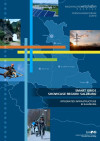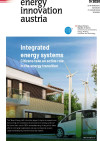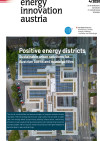Suchergebnisse
Spatial Energy Planning for Smart City Quarters and Smart Regions
In the project ERP_hoch3 energy related policy research in three Austrian agglomerations (Vienna – Lower Austria, Graz – Styria and Vorderland-Feldkirch) has been done, scenarios of the current state and the target state have been modelled and calculated. The aim was to develop generic transferable recommendations for spatial energy planning in agglomerations.
Kierling passive house - heading into the future sustainably
Using the example of demonstrational renovation, Kierling (built between 1977 and 1979) tests the possibilities of a renovation in passive house standard in technical, organizational and financial terms as an outstanding example of a comprehensive renovation.
"Energy saving" - the best PR strategy for sustainable housing?

The project aim is the clarification and PR-reevaluation of the thematic field "energy/energy saving" as a chance to study users and market forces close and factual to have a secure base for the development of new concepts, slogans and incentives in Austria.
e-genius.at: The Open Content knowledge and learning platform
The objective of the project was to develop online teaching materials on the topics energy-efficient buildings and renewable energy sources in collaboration with technical vocational schools and vocational higher secondary schools.
Conference: 8th A3PS Conference: Eco-Mobility 2013
3. - 4. October 2013
Tech Gate Vienna, Donau-City-Straße 11220 Vienna, AT
Strategies, R&D-Funding Programs and Projects of Industry, Research and Public Authorities for the Development and Market Introduction of Alternative Propulsion Systems and Fuels.
12th Heat Pump Conference: Rethink Energy, Act NOW!
15. - 18. May 2017
World Trade CentreRotterdam, NL
A conference where the latest development and prospects in technology, applications and markets are shared with applied professionals.
Smart Grids Showcase Region: Salzburg

Integratred Infrastructure in Salzburg
Forschungsforum
2/2010
Herausgeber: BMVIT
Englisch, 6 Seiten
Downloads zur Publikation
Energy Workshop Northern Waldviertel

A local " integrated" energy program - successful implementation through research cooperation
Forschungsforum
1/1996
Herausgeber: BMVIT
Englisch, 6 Seiten
Integrated energy systems

Citizens take an active role in the energy transition
energy innovation austria
3/2020
Herausgeber: BMK in cooperation with the Climate and Energy Fund
Englisch, 12 Seiten
Downloads zur Publikation
Positive energy districts

Sustainable urban solutions for Austrian towns and municipalities
energy innovation austria
4/2020
Herausgeber: BMK in cooperation with the Climate and Energy Fund
Englisch, 12 Seiten
Downloads zur Publikation
IEA-ISGAN Working Group 5: Smart Grids International Research Facility Network (SIRFN) (Working period 2021 - 2024)
As a global network, SIRFN works to improve the understanding of smart grid technologies and to promote their development and dissemination worldwide. Austria's participation during the project period ensured the networking and visibility of the Austrian smart grid research infrastructure at a global level and provided important access to a worldwide network of leading institutions and laboratories.
International Passive House Summer School for Students (PH-SS)
Summer school / workshop for design, construction and calculation of buildings in the passive house standard for students from Austrian and European universities.
Manual to realise initiatives for energy regions of tomorrow
Compilation of the manual to realise initiatives for energy regions of tomorrow; integrating the experiences generated in the winner projects, outcomes of representative energy-projects and the know-how of scientific works; distribution by multiplicators, realization of distribution activities
THERM-opti-BALCONY: Thermal Optimized Renovation of Balconies
Pre-cast cantilever balconies represent a particular problem in the thermal renovation of buildings. The central goal of this project is the development of practical and cost-effective mounting solutions for the thermally decoupled reconstruction of balconies on building frontages and achieving a significant increase in the energy performance of the thermal renovation measure.
Sunny Energy Building: ENERGYbase - Office building of tomorrow
Energybase is a showcase project in terms of energy efficiency and use of renewable energies realized by the Vienna business agency. With 7.500 sqm net floor area ENERGYbase provides space for innovative business and research and development on the field of green energy.
Potential for Growth and Exports of Renewable Energy Systems
Evaluation of mid- and longterm potential for growth and exports in various sectors of renewable energy systems. Analysis of corresponding impacts on employment and value added in Austria. Recommendations for research- and technology development.
Hydrogen Sustainability and Circularity Conference
26. February 2025
Online, AT
Sustainability and circularity are crucial for the implementation of hydrogen technologies. The conference will focus on the exchange of knowledge on the development of environmentally friendly and recyclable materials and innovative production technologies to increase the efficiency and reduce the cost of hydrogen technologies in the areas of green hydrogen production, storage and application.
IEA Bioenergy Task 39: Biofuels to Decarbonize Transport (Working period 2025)
IEA Bioenergy Task 39 is a network of international experts that aims to drive forward the decarbonization of transport with the help of sustainable biofuels, with a focus on the long-distance transport sector (aviation, shipping, heavy duty vehicles), which is more difficult to electrify. The aim of the national work is to collect and analyze information on the global technological and political status of biofuels and thus contribute to the development of sustainable, socially and environmentally compatible biofuel systems.
Webinar on Examples of Resilient Cooling Solutions
13. September 2022
Online
In this webinar EBC Annex 80 Experts will give you an overview of resilient cooling technologies as well as insights in recent progress on building products for heat mitigation. You will also learn about adsorption chillers and their applications.
